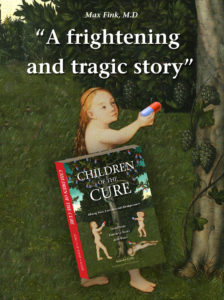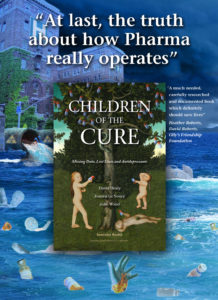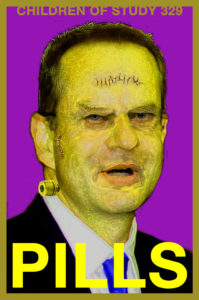Samizdat now features 3 Riffs on Children of the Cure, with more on the way. The first was by Max Fink – above – a second has come from Heather Roberts, below, who has posted further reflections on Olly’s Friendship Foundation Facebook page and a third from Bob Fiddaman, further down again. Bob also features at the moment on RxISK’s current venlafaxine withdrawal post.
What’s a Riff
We’ve invited several people to Riff on Children of the Cure rather than review it. What’s a Riff? First its not a review – an analysis by an expert of the book – its argument, or detail, or writing style, or philosophical position.
There are very few people on this earth who have been through the Children of the Cure saga and unless you have its like someone who has never given birth telling someone who has what giving birth is like. Or rather someone who has no children telling someone who has what effect having a child has – men can be dramatically affected by having a child.
Lots of you have given birth or had children and an increasing number have had lives touched by Children of the Cure – Study 329 like issues. You may be family to or friends of someone who died or was harmed by any of the 300 or more drugs that can cause suicide or homicide or related problems. You may be one of those whose lives have been made a living hell by withdrawal, PSSD or other problems triggered by treatment – the current RxISK post.
You may be a clinician or academic, who has seen the way trials are run and the problems hidden, or one who sees in their everyday work people being injured by drugs, but who figuring you are up against the “science” opted to keep quiet – which is understandable but it means cutting someone else loose and leaving them to their fate. Many of us likely have a degree of guilt and may even wonder who will help when the knock is on our door?
All of these people and many more – quite possibly you – can Riff on the Children theme – that is tell your story and how these issues have impacted on you. The hope in doing this is to generate a swelling Choral effect – as in Beethoven’s Odd to Joy with its line about “all people can be siblings”.
We can post anonymous Riffs. You might be a young person howling in dismay at the picture of our world that emerges from Children of the Cure – an almost no hope scenario. Or an older person, now resigned to seeing the world this way and semi-thankful you’re getting near the exit.
This post just hints at possible Riffs – we want to leave it to you to work out if there is a way and time for you to join in the chorus.



Get newsletter
The Conversation
Our re-analysis. found significant increases in harms with both the antidpressants used in Study 329, compared to the placebo. Steve Smith/Flickr, CC BY-NC
Antidepressant trial’s upended results show need for sharing all data
September 17, 2015 1.06am BST
Authors
Jon Jureidini
Research Leader, Critical and Ethical Mental Health research group, Robinson Research Institute, University of Adelaide
melissa Raven
Postdoctoral research fellow, University of Adelaide
Disclosure statement
Jon Jureidini was a founding member of Healthy Skepticism, and has provided expert analysis and opinion for plaintiffs about Study 329 and Forest’s paediatric citalopram randomised controlled trials.
Melissa Raven was a founding member of Healthy Skepticism.
With expert insight and analysis on vital issues from coronavirus to climate change, our articles will always be free to read. But by supporting The Conversation, you can help ensure the free flow of accurate information – essential to guide, reassure and inform in times like these. A small donation can help The Conversation ensure that you and others keep hearing from academic experts. (hmmm – skepticism applies to everything published regardless of how much we may admire or trust what theydo )
The Conversation UK receives funding from these organisations
We believe in the free flow of information
In 2001, a “landmark” study published in the prestigious Journal of the American Academy of Child and Adolescent Psychiatry purported to show the safety and effectiveness of using a common antidepressant to treat adolescents. But soon after its publication, both researchers and journalists raised questions about the research. And in an article we published today in the BMJ, we’ve shown that the original published findings were biased and misleading.
Our re-analysis has implications beyond Study 329; it has repercussions for all of evidence-based medicine.
The Illusion of Evidence-Based Medicine
Exposing the crisis of credibility in clinical research
Jon Jureidini, Leemon B. McHenry
The Illusion of Evidence-Based Medicine
An exposé of the corruption of medicine by the pharmaceutical industry at every level, from exploiting the vulnerable destitute for drug testing, through manipulation of research data, to disease mongering and promoting drugs that do more harm than good.
Authors, Professor Jon Jureidini and Dr Leemon McHenry, made critical contributions to exposing the scientific misconduct in two infamous trials of antidepressants. Ghostwritten publications of these trials were highly influential in prescriptions of paroxetine (Paxil) and citalopram (Celexa) in paediatric and adolescent depression, yet both trials (Glaxo Smith Kline’s paroxetine study 329 and Forest Laboratories’ citalopram study CIT-MD-18) seriously misrepresented the efficacy and safety data.
The Illusion of Evidence-Based Medicine provides a detailed account of these studies and argues that medicine desperately needs to re-evaluate its relationship with the pharmaceutical industry. Without a basis for independent evaluation of the results of randomised, placebo-controlled clinical trials, there can be no confidence in evidence-based medicine.
Science demands rigorous, critical examination and especially severe testing of hypotheses to function properly, but this is exactly what is lacking in academic medicine.
Jon Jureidini is Professor of Psychiatry and Paediatrics, Critical and Ethical Mental Health Research Group, Robinson Research Institute, University of Adelaide, Australia.
Leemon B. McHenry is Professor Emeritus in Philosophy at California State University, Northridge.
‘The Illusion of Evidence-Based Medicine is a brilliant exposé of the negative influence of the global pharmaceutical industry on the integrity of medicine. Every medical student, doctor and patient should read this account of the ways in which medical evidence is distorted to meet the needs of Big Pharma for profits. Importantly the book points to ways in which medicine’s independence can be reclaimed through improved governance and public funding.’ – Professor Fran Baum
‘In the race to find treatments and a vaccine for COVID-19, it’s more essential than ever that society can trust drug companies seeking regulatory approval. The Illusion of Evidence-Based Medicine is the latest in a long line of books that caution us not to hold out much hope.’ – Laura Spinney, Nature